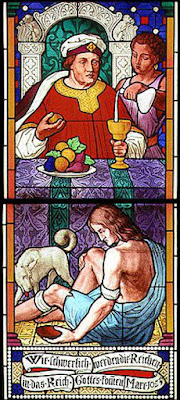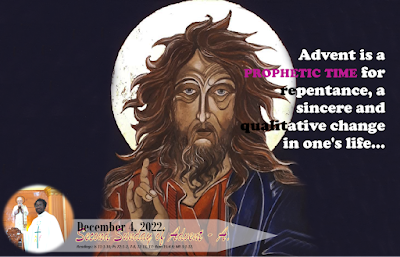In between God and the Rich, there is the Poor: On the principle of solidarity.
September 29 2019: Twenty-sixth Sunday in Ordinary Time - C
An American proverb says, “Charity is not a bone you throw
to your dog but a bone you share with your dog.” And another proverb adds, “The
greatest charity is to enable the poor to earn a living.”
Riches and poverty are a pair that has never been easy to
reconcile. Many people seem to find as main cause of poverty the rich people. In
that sense, some say, if one is poor, it is the fault of the rich. If one has
nothing to live on, it is simply because another one has everything for
himself. That could be understood in a certain view point, if only each one asks
himself the right and genuine question: what have I done to be rich or poor?
And what must I do now?
In some other aspect, many people read the Holy Scriptures as
categorically opposed to riches and to the rich. According to them, the Bible
always apostrophes and condemns the rich and material possession. That sounds
as if God was against wealth. This kind of reading of Scriptures is absolutely wrong
and filled with heresies. May we say it before hand, that God is not against the
rich and he does not hate riches. What the Lord condemns, and that is what the
Bible points out, is what the material possession makes of man and the use that
mankind does of wealth. The final words of the Lord Jesus in last Sunday’s
Gospel sounds more actual: “You cannot serve both God and mammon.” Money and
any other material good are not to be served, but to serve and be used for our
good and the good of others; and that is called solidarity.
Today’s liturgy is another set of saying about riches and
poverty. We read as summary of the first reading and the Gospel that the true
friends of God are the poor. The Prophet Amos, in the first reading, throws curses
on the rich people and on those who are at ease with material wealth. Because,
they were not able to make use of their possession and all that they have in
order the fill the emptiness of the needy. Their riches, instead of becoming a
means of communion and community, has led them to classification and social
division. The society was divided into casts and the poor, unfortunately, were
left as the Lord’s lot, having nothing and no one but God alone.
What Amos condemned in his society is easily noticeable and
can be said of our today’s world. One needs just to look at how our cities are
built and see the fact. The rich people live among themselves in what we call
subdivisions; selected environments exclusively for rich and far away from the noises
and from reachability of the poor or less fortunate. We talk of residential
areas for rich and of slums for the poor. The accusations and curses of Amos
could be directed to many of us today, who live, insensitive to the cries of
others, and despise the rights of the poor and the needy.
Paul, in the second reading will call upon each of us,
disciples of Christ. We have this as obligation, because of our belonging to
Christ, to keep his commandments. Paul addressing to Timothy invites him to aim
at “righteousness, devotion, faith, love, patience, and gentleness. Compete
well for the faith…” And all these, Paul resumes them in a unique sentence: “to
keep the commandment without stain or reproach until the appearance of our Lord
Jesus Christ…” The commandment in question here is that of love, which is also
called charity; opening oneself to the needs of others.
The Gospel of Luke comes to seal the fact. We read from it
that the Lord takes the party of the poor. He always stands on the side of the
marginalized and forgotten of our societies. These are his friends. Because, he
knows them by name. They are ‘Lazarus’, “God has helped.” While the rich are
nameless.
Between you and God, there is a Lazarus. Thus, what you do
to that Lazarus, you do it to the Lord. Consequently, what you refuse to do or
fail doing to your Lazarus, you fail doing it to God who is with him. That is
well expressed in Matthew 25:31-46, talking of the Judgment of the Nations. The
Lord said, “Amen, I say to you, whatever you did for one of these least
brothers of mine, you did for me.”
The parable of the poor Lazarus and the rich man, far from
being a consecration of poverty, is a warning the Lord addresses to each of us,
today. We are advised that if what we have does not open our heart, hands, and
eyes to our brothers and sisters in need, but instead, blinds us or lead us to
a closed heart and ears to their cries, and to live insensitive or far away
from them, we will, like the rich man of the parable, die and our possessions
won’t be of use for our salvation.
The thirst for wealth and material possession is the cause
of all evil. But if what we have is used to help the less fortunate, that is
solidarity, we will surely save ourselves. Because charity provides for our
visa to heaven; and “Whoever is generous to the poor lends to the Lord” (Proverbs
19:17).
Riches has never, and will never be a problem. The precise
problem is what man makes of riches or what does material good lead man to do. If
your money and possessions blind you to the poor, you build for yourself a wall
preventing you to reach out to God. But if you make use of what you have in
serving the needy, that raises a bridge leading you God’s Kingdom. Thus, material
possession can either be a wall or a bridge. It is up to you of what you want
of it.
About solidarity, the Catechism of the Catholic
Church has a beautiful teaching: “The principle of solidarity, also articulated
in terms of "friendship" or "social charity," is a direct
demand of human and Christian brotherhood…” (CCC. 1939). The poor is a brother
in need. We should be eager to open ourselves to him and help him. Our money
and any other possession we owe are blessings from God. When wisely used, they
contribute bringing us close to Him. While, when used greedily and
egoistically, they blind us to others and lead us astray from God, taking us straight
into Hell, without a return ticket. Open your eyes to your brother Lazarus lying
at your door. There is a great abyme between riches and poverty that only
charity or solidarity can fill.





Maraming salamat po father stan.
ReplyDeleteNapakadami ko pong natuyunan po nagpapasamat po ako sa iyo ng buong puso.
Godbless